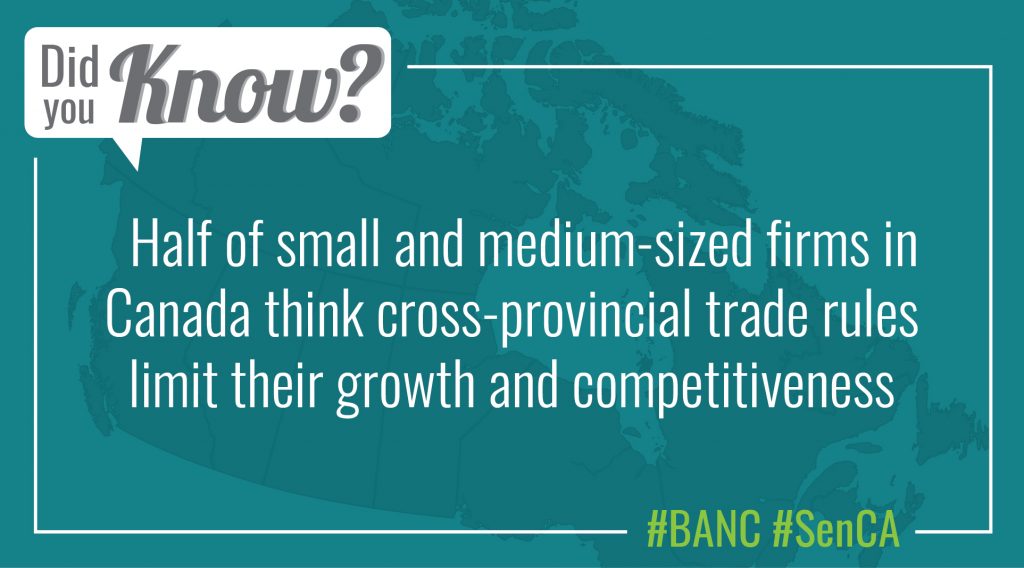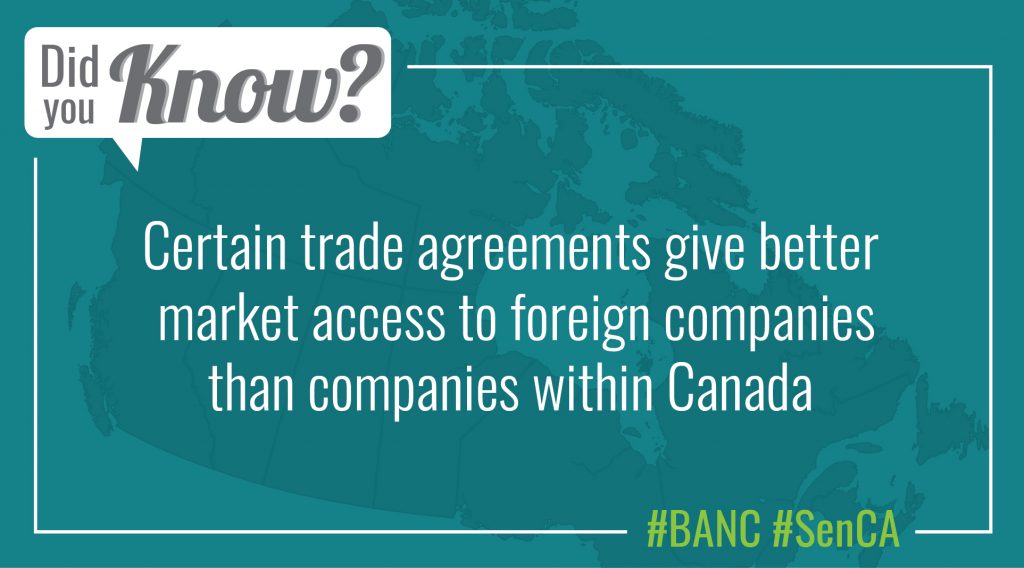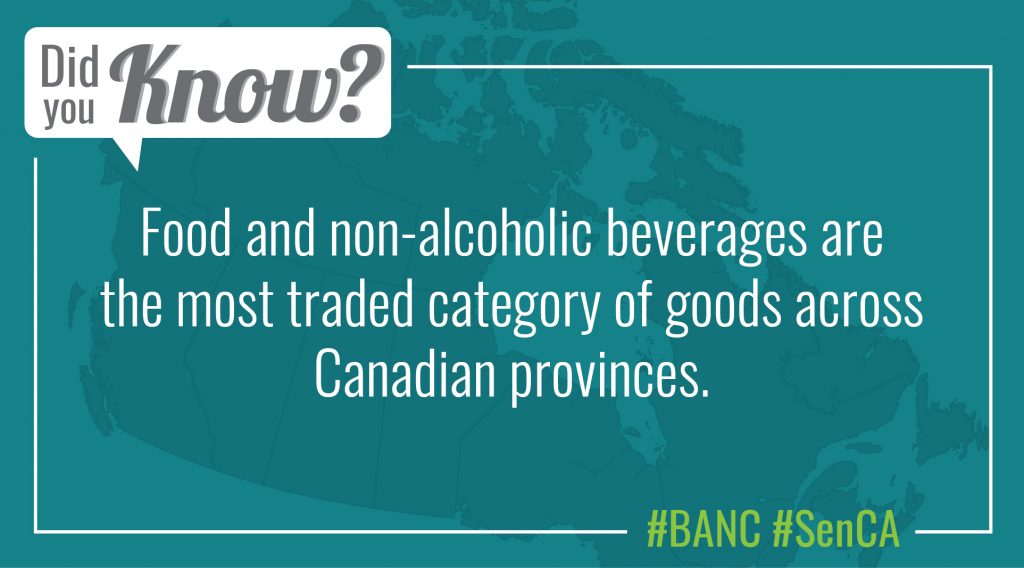Breaking Barriers to Trade

The Senate Committee on Banking, Trade and Commerce is examining barriers to trade within Canada and their effect on business, economics and relationships. The committee has hosted over ten meetings in Ottawa and this week members completed two fact-finding missions — one to Vancouver and one to Calgary.
Over the years, provinces and territories evolved their own rules about trade to protect key industries. Some of these rules — enshrined in various pieces of legislation — are obsolete but continue to stifle trade.
Day 1: Vancouver

Internal barriers to trade make it easier for a Canadian to do business with Europe than with someone who lives in a different province, a former cabinet minister told the committee.
James Moore, who served as Minister of Industry, spoke candidly to Senators about some of the strange rules obstructing interprovincial trade.
He asked members to imagine two young entrepreneurs, one living in Brussels and one living in Burnaby, B.C. If both developed a mobile payment application for city parking meters and tried to sell the technology to Edmonton, Moore said the Belgian inventor would have the advantage as a result of current provincial barriers that make doing business increasingly difficult.
Internal trading rules like these impede Canadian companies from reaching their potential, Moore said. That, in turn, restricts economic growth.
The committee also met with transportation experts and a vintner. They provided interesting examples of very odd barriers. B.C. truck drivers are limited to driving at night and drivers from Alberta are limited to the day. The B.C. driver would then have to wait at the border for daytime Alberta hours, which slows the transport of goods. The B.C. vintner, meanwhile, said she can receive a case of wine from Ontario, but she cannot send her own wine to Ontario, cutting her off from potential customers.

Day 2: Calgary
Removing barriers to trade could provide between $50 and $130 billion boost to the economy, the committee heard.
In Calgary, on their second day of fact-finding, committee members met with academics and economists who complemented the real-life examples from Vancouver’s witnesses with a much more theoretical approach.
One professor said removing these troublesome barriers could lead to a spike in Canada’s GDP by three to seven per cent, equivalent to approximately $50 billion.
But witnesses cautioned that there is not a great deal of statistical information about trade barriers, making their economic impact difficult to measure. Good policy, witnesses said, requires good data.

Nevertheless, witnesses agreed that political will is key to lifting barriers. Provinces are likely to want to maintain restrictions and exclusions, as an act of protection for their local entrepreneurs. However, considering the likely overall benefit to Canada, internal trade needs to be less complicated, the committee heard.
The committee finished its hearings this week and plans on tabling a report in June.
Additional information :
Trade barriers have blocked the growth of some Canadian companies. It’s often easier for a business in BC to export to Europe than it is to export to Alberta.
It’s often easier for a business in BC to export to Europe than it is to export to Alberta.
 Wholesalers, transportation, and mineral fuels are the other top categories.
Wholesalers, transportation, and mineral fuels are the other top categories.
 Provincial rules dictate how much alcohol can be imported or exported to provinces.
Provincial rules dictate how much alcohol can be imported or exported to provinces.

*Please note that as of July 31, 2022, the name of the Senate Committee on Banking, Trade and Commerce was changed to the Senate Committee on Banking, Commerce and the Economy. More information about this change can be found here.
Related articles
Tags
Committee news
Breaking Barriers to Trade

The Senate Committee on Banking, Trade and Commerce is examining barriers to trade within Canada and their effect on business, economics and relationships. The committee has hosted over ten meetings in Ottawa and this week members completed two fact-finding missions — one to Vancouver and one to Calgary.
Over the years, provinces and territories evolved their own rules about trade to protect key industries. Some of these rules — enshrined in various pieces of legislation — are obsolete but continue to stifle trade.
Day 1: Vancouver

Internal barriers to trade make it easier for a Canadian to do business with Europe than with someone who lives in a different province, a former cabinet minister told the committee.
James Moore, who served as Minister of Industry, spoke candidly to Senators about some of the strange rules obstructing interprovincial trade.
He asked members to imagine two young entrepreneurs, one living in Brussels and one living in Burnaby, B.C. If both developed a mobile payment application for city parking meters and tried to sell the technology to Edmonton, Moore said the Belgian inventor would have the advantage as a result of current provincial barriers that make doing business increasingly difficult.
Internal trading rules like these impede Canadian companies from reaching their potential, Moore said. That, in turn, restricts economic growth.
The committee also met with transportation experts and a vintner. They provided interesting examples of very odd barriers. B.C. truck drivers are limited to driving at night and drivers from Alberta are limited to the day. The B.C. driver would then have to wait at the border for daytime Alberta hours, which slows the transport of goods. The B.C. vintner, meanwhile, said she can receive a case of wine from Ontario, but she cannot send her own wine to Ontario, cutting her off from potential customers.

Day 2: Calgary
Removing barriers to trade could provide between $50 and $130 billion boost to the economy, the committee heard.
In Calgary, on their second day of fact-finding, committee members met with academics and economists who complemented the real-life examples from Vancouver’s witnesses with a much more theoretical approach.
One professor said removing these troublesome barriers could lead to a spike in Canada’s GDP by three to seven per cent, equivalent to approximately $50 billion.
But witnesses cautioned that there is not a great deal of statistical information about trade barriers, making their economic impact difficult to measure. Good policy, witnesses said, requires good data.

Nevertheless, witnesses agreed that political will is key to lifting barriers. Provinces are likely to want to maintain restrictions and exclusions, as an act of protection for their local entrepreneurs. However, considering the likely overall benefit to Canada, internal trade needs to be less complicated, the committee heard.
The committee finished its hearings this week and plans on tabling a report in June.
Additional information :
Trade barriers have blocked the growth of some Canadian companies. It’s often easier for a business in BC to export to Europe than it is to export to Alberta.
It’s often easier for a business in BC to export to Europe than it is to export to Alberta.
 Wholesalers, transportation, and mineral fuels are the other top categories.
Wholesalers, transportation, and mineral fuels are the other top categories.
 Provincial rules dictate how much alcohol can be imported or exported to provinces.
Provincial rules dictate how much alcohol can be imported or exported to provinces.

*Please note that as of July 31, 2022, the name of the Senate Committee on Banking, Trade and Commerce was changed to the Senate Committee on Banking, Commerce and the Economy. More information about this change can be found here.


